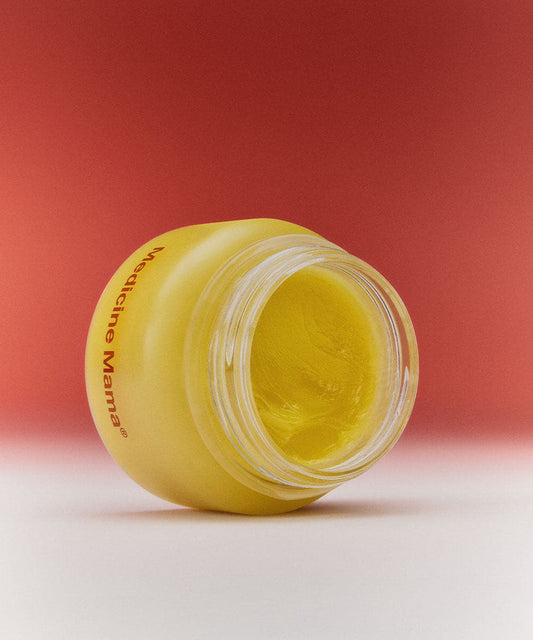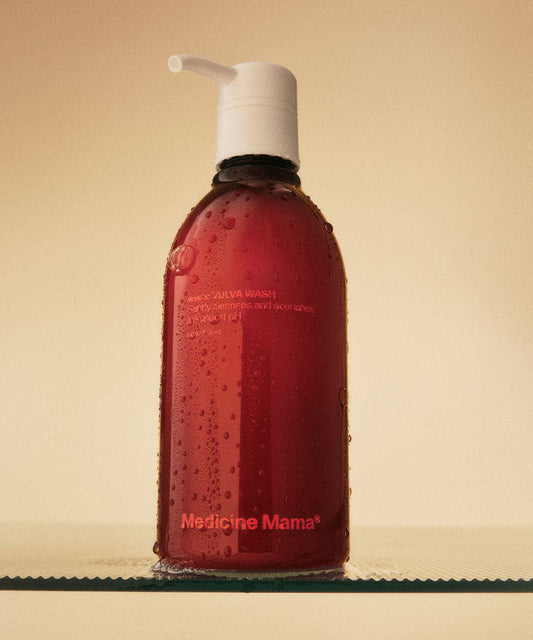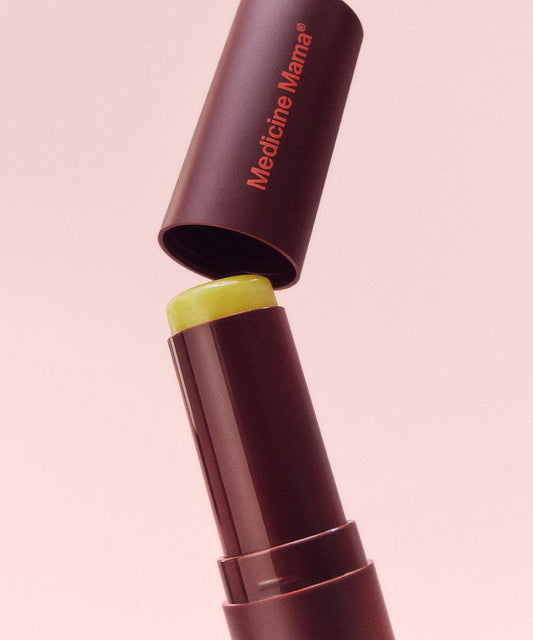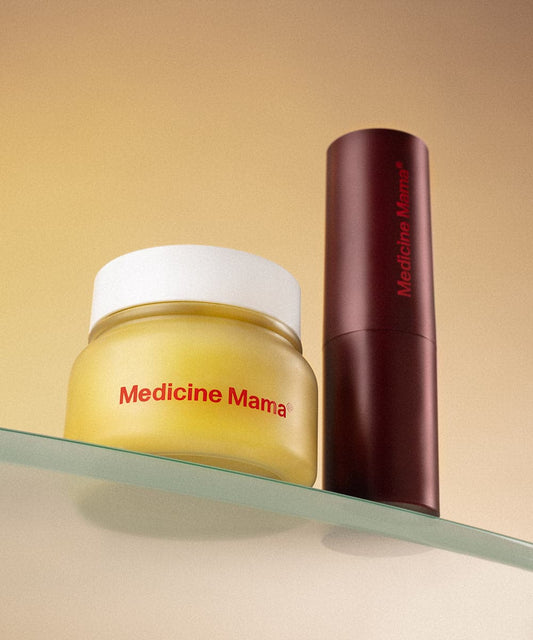
Reviewed by | Melinda (Melle) Hany, RN, ADN Registered Nurse
You’re standing there, staring at two bottles: one says vaginal moisturizer, the other says lubricant. You’re dealing with dryness and just want to feel like you again, but now you’re wondering… do you need both? One or the other? Neither?
Here’s the thing: vaginal moisturizers and lubricants are the one-two punch your body needs to kick dryness for good. They’re different tools for different jobs, but they work best when you use them together. Moisturizers help nourish and hydrate your skin over time, while lube gives you the extra slip and slide you need right now.
At Medicine Mama, we’re all about helping you understand how these products work and when to use each. Let’s break it down so you can feel good inside and out.
When Should You Use a Vaginal Moisturizer?
If dryness is showing up outside the bedroom — during workouts, sitting too long, or just going about your day — a vaginal moisturizer might be exactly what your body needs.
These little game-changers are made to be part of your regular routine. They support hydration and comfort in the tissue of the vulva and vaginal opening, especially when your body’s natural moisture levels start to shift.
This usually happens during perimenopause, menopause, postpartum, or while breastfeeding, but it can also come from medication, stress, or just getting older. It’s not just about feeling dry, either.
You might notice irritation, tightness, itchiness, or a general feeling of being more sensitive down there than usual. Maybe wearing leggings suddenly feels annoying, or your skin gets irritated from walking around all day. That’s the kind of dryness a moisturizer is made to help with. “It’s like the skin on your face, but even more sensitive,” notes Melinda Hany, Registered Nurse.
When Is Lubricant the Right Choice?
Lubricant is more of a “right now” solution. It’s often used during sex or other intimate activities to help reduce friction and make everything feel smoother and more comfortable. If you’re already turned on but still feeling dry — or if penetration is starting to feel a little uncomfortable or tense — that’s when a good lube makes a big difference.
There are a lot of reasons why your body might not produce as much natural lubrication as it used to. Hormones, medications, stress, lack of foreplay, even just being tired can all play a role. It’s common and nothing to feel weird about. Lube helps bridge the gap between your mind and your body.
Can You Use Both a Moisturizer and a Lubricant?
Absolutely — moisturizers and lubricants aren’t competing. They actually complement each other really well. One helps you feel more comfortable day to day, the other helps you feel better in the moment (and can even be used for day-to-day comfort, if it’s a good one!). There’s no rule that says you have to pick one and stick with it.
Think of it this way: just because you use lip balm every morning doesn’t mean you won’t still grab gloss before going out. Same idea. You’re responding to what your body needs, whether that’s more comfort during the day or more ease during sex.
And if dryness is something you deal with often, using both can actually make everything feel more manageable. You’re not patching a problem — you’re building support from both angles.
What Should You Look for on the Label?
So, you’ve decided to get your hands on a moisturizer and a lube. Now comes the part where you turn the bottle around and try to decode what’s actually in it. The good news? You don’t need to memorize a list of ingredients to make a solid choice.
You just need to know what matters — and what to avoid.
Moisturizers
If it’s going near the vulva or vaginal opening, skip anything with fragrance, dyes, or mystery chemicals you can’t pronounce. This area is sensitive, and the last thing it needs is a perfume-soaked cream pretending to be helpful.
Instead, look for gentle, well-tested formulas that are made specifically for vulvar skin. Organic oils, calming ingredients, and hormone-free formulations are a good sign you’re in the right place.
That’s exactly why VMAGIC® Vulva Balm has become such a go-to — it’s made with organic, simple ingredients, no added fragrance, and zero nonsense. You can use it daily to soothe dryness from menopause, postpartum shifts, grooming irritation, or just the wear and tear of everyday life.
Lube
For lubricants, look for something water-based like our Intimate Glide if you’re using condoms or toys (oil and silicone-based lubes can interfere with both). Avoid glycerin if you're prone to irritation, and skip anything that uses “cooling” or “tingling” language — those usually mean added chemicals that can be way too harsh for this part of the body.
And no matter what you’re buying, the phrase “for external use only” isn’t just a suggestion. Check if the product is made for the vulva, vaginal opening, or both, because placement matters, and using the wrong thing in the wrong place can undo all the good you were trying to do.
How Do You Know If It’s Working for You?
Wondering if the product you’re using is actually doing anything? We get it — it’s easy to assume it should be instant magic, but real results can be a little more subtle.
Is your skin feeling less reactive? Are things no longer itchy, tight, or dry by midday? Is putting on leggings no longer a personal test of patience? If you're not noticing those little improvements within a week or two of regular use, it might be time to switch it up.
You’ll know whether a lubricant is working for you pretty quickly. If things feel smoother and you’re not left feeling raw or irritated afterward, it’s probably doing its job. But if you’re still feeling friction, stinging, or just off, that lube might not be the right one for you.
Same goes if it feels sticky, dries up too fast, or leaves behind a strange residue. That’s not a vibe. Also worth noting: if something burns, itches, or feels worse after you use it, stop using it. Your body’s giving you feedback, loud and clear.
Trust how you feel. The right products should support your body, not make you second-guess what’s going on. If you’re constantly wondering if it’s “supposed” to feel like that, it’s probably not.
The Bottom Line
Moisturizer and lube aren’t an either-or situation. They’re a team. Moisturizers help keep your tissues hydrated day-to-day, while lube gives you the comfort and glide you need in the moment. Together, they’re the one-two punch that can help you feel like you again, no second-guessing required.
And if you’re still not sure where to start? Your OB-GYN or pelvic floor therapist is your go-to. They can help you figure out what your body actually needs (hint: it’s not another scented wipe).
At Medicine Mama, we’re here to make vulva care simple, supportive, and boldly pure. Our products are made with intentionally chosen ingredients, backed by real science, and designed to help you feel more comfortable, more confident, and more in touch with yourself.
Ready to find your match? Check out our lineup of vulva-safe essentials today. Trust us — you’ll be glad you did.
Sources:
Vaginal Dryness: Causes, Symptoms & Treatment | Cleveland Clinic
Lubricants for the promotion of sexual health and well-being: a systematic review | PMC



